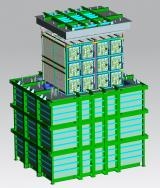Atacama Cosmology Telescope (ACT)
Science Goal: ACT is a 6m radio telescope dish located in the Atacama Desert in Northern Chile. Measurements of the CMB have been a workhorse in precision cosmology, constraining parameters like the geometry of the Universe and its constituents (dark matter, baryonic matter, neutrinos, dark energy) and provide the high-precision measurements required for additional constraints from Large Scale Structure.
WL Involvement: The Yale team made high resolution measurements of the Cosmic Microwave Background (CMB), which is the relic light from the Universe when it was ~380,000 years old.

Argon Neutrino Test (ArgoNeuT)
Science Goal: ArgoNeuT, an R&D experiment designed to detect and record neutrino interactions from the Neutrinos at the Main Injector (NuMI) beam at Fermi National Accelerator Laboratory (Fermilab), was the first Liquid Argon Time Projection Chamber (LArTPC) operating in a low energy neutrino and antineutrino beam, the region of interest for current short-baseline and future long-baseline experiments.
WL Involvement: The Yale team played a leading role in the project and the group analyzed and used the data for several research programs.
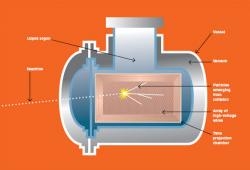
CMB-S4
Science Goal: Make measurements of the Cosmic Microwave Background with an order of magnitude greater than any current experiment.
WL Involvement: Newburgh led the data acquisition and control group, mainly building software to control and acquire data from the telescopes.
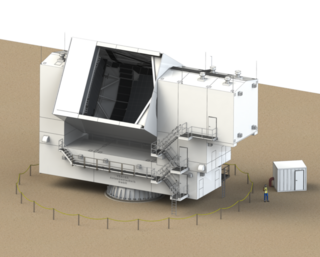
Daya Bay
Science goal: Search for and measure the yet unknown neutrino mixing angle theta13.
WL involvement: Yale had overall responsibility in the U.S. for the design and construction of the antineutrino detectors and was involved in data analysis and measurements.

DM-Ice
Science Goal: DM-Ice is a direct-detection dark matter experiment to test DAMA’s assertion that the observed annual modulation is due to dark matter. DM-Ice aims to understand the origin of DAMA’s signal by using the same target, and is the only experiment with access to both Northern and Southern Hemispheres. DM-Ice is a phased experimental program; the current phase is COSINE-100.
WL Involvement: Reina Maruyama was the Principal Investigator of the experiment.
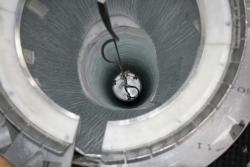
The Enriched Xenon Observatory (EXO-200)
Science Goal: EXO-200 is searching for the extremely rare neutrinoless double beta decay of 136Xe, which can only occur if neutrinos are Majorana particles — i.e. if there is no fundamental difference between a neutrino and antineutrino. Observing neutrinoless double beta decay would provide direct evidence for new physics beyond the Standard Model of particle physics.

Liquid Argon TPC in a Testbeam (LArIAT)
Science Goal: LArIAT is a project at Fermilab to calibrate the Liquid Argon Time Projection Chamber (LArTPC) technology. LArIAT uses the repurposed ArgoNeuT TPC in the Fermilab Test Beam Facility (FTBF).
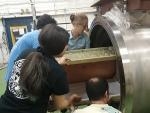
MicroBooNE
Science Goal: MicroBooNE is a short baseline accelerator neutrino oscillation experiment at Fermilab designed to investigate the source of the low energy excess observed by the MiniBooNE experiment, perform a unique set of low energy neutrino cross section measurements, and conduct R&D towards development of massive LArTPC detectors.
WL involvement: Yale’s roles included fabrication and assembly of the TPC and DAQ systems, development of the analysis techniques and tools necessary to analyze the data, and oversight of the collaboration.
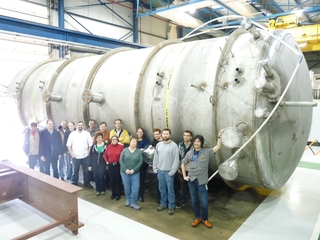
Harris Lab
Science Goal: The Harris lab uses ultrasensitive micromechanical detectors to study mesoscopic electronic systems. This work focuses on normal-metal persistent currents, a quantum phenomenon in which electrical current flows through a resistor in the absence of a voltage.
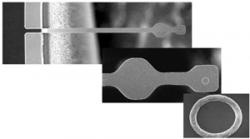
PROSPECT
Science goal: Precision measurements of antineutrinos, search for sterile neutrinos, & develop technology for monitoring nuclear reactors for safeguard and non-proliferation.
WL involvement: PROSPECT was designed and built at Wright Lab in collaboration with national labs and other universities.
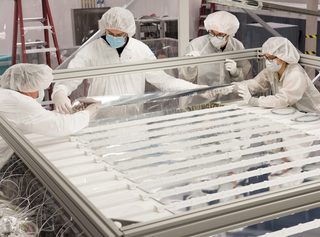
Short Baseline Near Detector (SBND)
Science Goal: The SBND is a near detector experiment being developed on the Booster Neutrino Beamline at Fermilab upstream from MicroBooNE. While MicroBooNE will determine whether or not the low energy excess observed by MiniBooNE is electrons or photons, SBND will look for this excess at a near location to look for a baseline dependence of what MicroBooNE observes.
WL Involvement: The Yale team is also constructing components of the TPC at Wright Lab, including the TPC field shaping system, the high voltage feedthrough and part of the scintillation light collection system.
